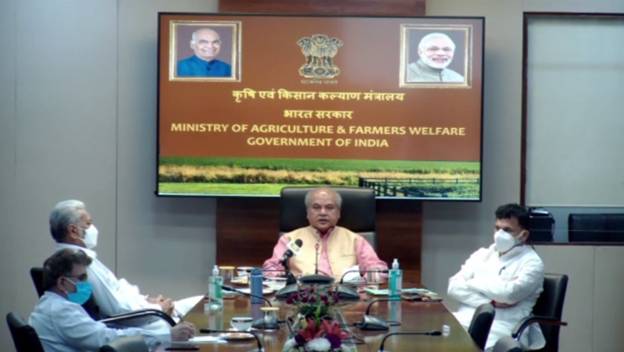* Agriculture and allied sectors registered a continuous growth in GDP contribution amid pandemic: Narendra Singh Tomar
* Foodgrains production target is 307 million tonnes for 2021-22: Union Agriculture Minister
Union Minister of Agriculture & Farmers Welfare, Narendra Singh Tomar inaugurated ‘The National Conference on Agriculture for Kharif Campaign-2021’ on 30th April, 2021. Ministers of State for Agriculture & Farmers Welfare, Parshottam Rupala and Kailash Choudhari were also present on the occasion. The conference was organized through video conference to interact with the States on challenges & strategies for effective crop management during ensuing Kharif season.

During the conference, discussion was held to review and assess the preparedness for management of Kharif crops and ensuring availability of seeds, pesticides, fertilizers, machinery and their prepositioning at Block levels. Besides this, discussion also took place on preparedness for drought like situation if it occurs in any district, integrated nutrient management and integrated pest management, crop diversification and increasing farmer’s Income; focused strategy for production of oilseeds and pulses; marketing of Rabi crops and procurement at MSP, action plan and advisory/guidelines for agriculture management in the wake of COVID pandemic.
Inaugurating the Conference, the Union Minister of Agriculture & Farmers Welfare, Narendra Singh Tomar appreciated the efforts of farmers for the record production for food grains (303.34 million tonnes), which is over 1.96% higher than the previous year's output (297.50 Million Tonnes). The pulses and oilseed production are 24.42 & 37.3 million tonnes, respectively. The Minister said agriculture sector has shown its resilience amid the adversities of COVID-19 pandemic. Agriculture and allied sectors registered a continuous growth in GDP contribution. The share of agriculture in GDP increased from 17.8% in 2019-20 to 19.9% in 2020-21 as per Economic Survey 2020-21. He also complimented the State Governments for effective implementation of Centrally Sponsored Schemes for the welfare of farmers.
Tomar announced the setting of higher production targets of food grains from 301.92 to 307 million tonnes for the year 2021-22 in comparison to production targets for previous corresponding year 2020-21. As per 2nd advance estimate the achievements are likely to be 303.34 million tonnes for year 2020-21. Higher production targets for pulses and oilseeds are the necessity of the nation to reduce our dependency on import and to achieve the dream of Aatmanirbhar Bharat.
Expressing the concern over the shortage of Oilseeds and pulses, Tomar requested State Governments to work on mission mode to overcome the shortage situation. He also requested the state Governments to identify such places which are following organic farming and are free from chemicals so that they can be certified as organic and can be linked with the market. He assured them that Government of India will support to solve all the problems faced by State Governments.
The Secretary (AC&FW), Sanjay Aggarwal informed that the department has decided to distribute seed mini-kits for kharif crops with the active involvement of State Agriculture Department. The State Agriculture Departments should project their demands of farm inputs to the Centre for its intervention to ensure the timely availability of seeds and fertilizers to the farmers at crucial stages of crop production. The Secretary DARE, Dr. Trilochan Mohapatra informed that the bio-fortified varieties have been released with better quality aspects of enhanced nutrients and proteins etc.
At the outset, Agriculture Commissioner, DAC&FW Dr. Suresh Malhotra presented status and strategies for crop management in Kharif season. He mentioned about record food grain production in 2020-21 (303 million ton) and said that summer season area has increased (63.44 to 75.75 lakh ha) due to implementation of special program on summer/Zaid season. He also called upon states to take full benefit of monsoon which has been predicted normal (98% of long period average). In drought prone vulnerable areas contingency plan may be adopted. Agroclimatic zone wise planning, cluster approach, cropping system centric approaches needs to be followed by states. From input point of view the position is comfortable for seed, fertilizers, pesticides and machinery except soyabean and maize where states can procure seed from NSC, private sources and even farmers own saved seed in emergency.
All the States interacted through VC and briefed about their achievements and progress and appraised the Centre with the constraints faced by them.
The Secretary (AC&FW), Secretary (Fertilizer), Secretary (DARE) and senior officers of DAC&FW, DARE, ICAR and the senior officers of States/UTs participated in the conference. State Governments and UTs with their APCs, Principal Secretaries, Secretaries and Commissioners & Directors from the State Agriculture Departments and Agriculture Scientists from ICAR and State Agriculture Universities (SAUs) deliberated on plan to increase the productivity and production through new production technologies, diversification, crop rotations, crop intensity, post-harvest technologies and value additions.
